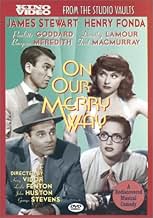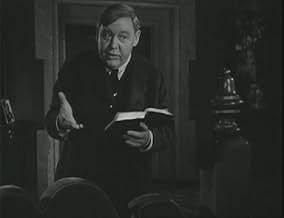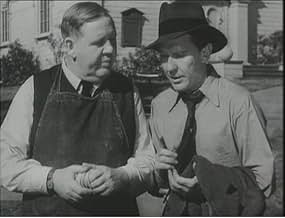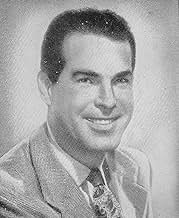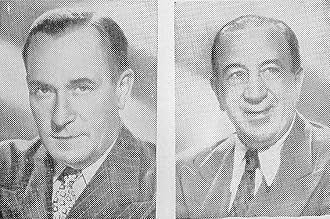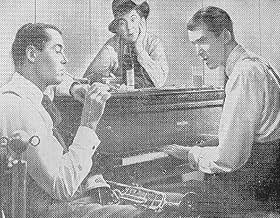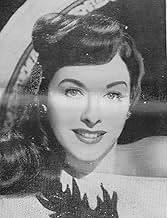Füge eine Handlung in deiner Sprache hinzuThree short stories revolving around the topic of the daily question posed by the roving reporter to the readers of a daily newspaper.Three short stories revolving around the topic of the daily question posed by the roving reporter to the readers of a daily newspaper.Three short stories revolving around the topic of the daily question posed by the roving reporter to the readers of a daily newspaper.
Carl 'Alfalfa' Switzer
- Leopold 'Zoot' Wirtz
- (as Carl Switzer)
Handlung
WUSSTEST DU SCHON:
- Wissenswertes"A Miracle Can Happen" was the original title of this film when released on Feb. 3, 1948 at the Warner Theater in Manhattan. It consisted of three short stories (about 20-25 minutes each) linked by the Burgess Meredith character. He played a reporter looking for a good scoop, and in the second sequence, Charles Laughton played a bible-reading minister. When it was released nationally in June, however, it had been decided that the religious story would be dropped and replaced by a more comic one featuring Dorothy Lamour. The film in this new version was then re-titled "On Our Merry Way". However, prints of the original film had already been sent abroad for dubbing. In Spain, "A Miracle Can Happen" became "Una Encuesta Llamada Milagro", complete with the original Laughton sequence intact (but without the alternative Lamour story). As it has been released on DVD there and retains the English-language soundtrack, the movie can be seen as it was originally intended.
- Alternative VersionenThe version released in Spain and always seen on both TV and DVD, in dubbed and subtitled versions (bearing the title card "A Miracle Can Happen"), includes the Charles Laughton episode but not the Dorothy Lamour one.
- VerbindungenFeatured in Henry Fonda: The Man and His Movies (1982)
Ausgewählte Rezension
As the "Trivia" section states, Charles Laughton was in the original version of this film under its title "A Miracle Can Happen". His was a sequence of 20 minutes or so which came between the Fonda/Stewart story and the one with Fred MacMurray which ended the movie. During the war, Laughton had taken to reading from great works of literature, including the Bible, to invalided US servicemen. He continued to give reading tours after the war and his appearance in "A Miracle Can Happen" was clearly an attempt to put one of his Bible readings on film. He played a washed-out minister who bores his congregation to tears, but one rainy night a small boy asks Laughton to visit his sick father. In an attempt to boost the dying man's spirits, Laughton rises to the occasion with an over-the-top delivery of the Saul and David story that completely revitalises the father. It then turned out that the little boy who invited Laughton in, but who has now disappeared from the scene, had died some years earlier. So, as Laughton told Meredith at the end of the sequence, "a miracle happened."
For whatever reason, the Laughton sequence was deleted from the US release but not before prints has been sent abroad to other countries. Consequently, it has long been known that, for example, a Spanish version of "A Miracle Can Happen" - with Laughton and all the others dubbed into that language - has been seen on TV in Spain and is now available there on DVD, complete with the original English dialogue.
With Laughton having been deleted, the Dorothy Lamour sequence was added in as a replacement, and the film was duly re-titled "On Our Merry Way." I agree with the sentiments expressed by others who find this film an embarrassment all round. Fonda and Stewart are no masters of farcical comedy and neither are any of the other principals. As for Laughton in the original film, his hamming up of the Bible story has to be seen to be believed. Nevertheless, both versions are of some interest because of the talents involved but I agree with anyone who says that once you've seen either version you're not likely to want to see them again!
For whatever reason, the Laughton sequence was deleted from the US release but not before prints has been sent abroad to other countries. Consequently, it has long been known that, for example, a Spanish version of "A Miracle Can Happen" - with Laughton and all the others dubbed into that language - has been seen on TV in Spain and is now available there on DVD, complete with the original English dialogue.
With Laughton having been deleted, the Dorothy Lamour sequence was added in as a replacement, and the film was duly re-titled "On Our Merry Way." I agree with the sentiments expressed by others who find this film an embarrassment all round. Fonda and Stewart are no masters of farcical comedy and neither are any of the other principals. As for Laughton in the original film, his hamming up of the Bible story has to be seen to be believed. Nevertheless, both versions are of some interest because of the talents involved but I agree with anyone who says that once you've seen either version you're not likely to want to see them again!
- kerrison-philips
- 1. Okt. 2007
- Permalink
Top-Auswahl
Melde dich zum Bewerten an und greife auf die Watchlist für personalisierte Empfehlungen zu.
- How long is On Our Merry Way?Powered by Alexa
Details
- Erscheinungsdatum
- Herkunftsland
- Sprache
- Auch bekannt als
- A Miracle Can Happen
- Drehorte
- Produktionsfirma
- Weitere beteiligte Unternehmen bei IMDbPro anzeigen
- Laufzeit1 Stunde 47 Minuten
- Farbe
- Seitenverhältnis
- 1.37 : 1
Zu dieser Seite beitragen
Bearbeitung vorschlagen oder fehlenden Inhalt hinzufügen

Oberste Lücke
By what name was On Our Merry Way (1948) officially released in India in English?
Antwort
